Note
Click here to download the full example code
Audio I/O
This tutorial shows how to use TorchAudio’s basic I/O API to load audio files into PyTorch’s Tensor object, and save Tensor objects to audio files.
import torch
import torchaudio
print(torch.__version__)
print(torchaudio.__version__)
Out:
1.12.0
0.12.0
Preparation
First, we import the modules and download the audio assets we use in this tutorial.
Note
When running this tutorial in Google Colab, install the required packages with the following:
!pip install boto3
import io
import os
import tarfile
import tempfile
import boto3
import matplotlib.pyplot as plt
import requests
from botocore import UNSIGNED
from botocore.config import Config
from IPython.display import Audio
from torchaudio.utils import download_asset
SAMPLE_GSM = download_asset("tutorial-assets/steam-train-whistle-daniel_simon.gsm")
SAMPLE_WAV = download_asset("tutorial-assets/Lab41-SRI-VOiCES-src-sp0307-ch127535-sg0042.wav")
SAMPLE_WAV_8000 = download_asset("tutorial-assets/Lab41-SRI-VOiCES-src-sp0307-ch127535-sg0042-8000hz.wav")
Out:
0%| | 0.00/7.99k [00:00<?, ?B/s]
100%|##########| 7.99k/7.99k [00:00<00:00, 4.37MB/s]
0%| | 0.00/106k [00:00<?, ?B/s]
100%|##########| 106k/106k [00:00<00:00, 36.5MB/s]
0%| | 0.00/53.2k [00:00<?, ?B/s]
100%|##########| 53.2k/53.2k [00:00<00:00, 18.6MB/s]
Querying audio metadata
Function torchaudio.info() fetches audio metadata.
You can provide a path-like object or file-like object.
metadata = torchaudio.info(SAMPLE_WAV)
print(metadata)
Out:
AudioMetaData(sample_rate=16000, num_frames=54400, num_channels=1, bits_per_sample=16, encoding=PCM_S)
Where
sample_rateis the sampling rate of the audionum_channelsis the number of channelsnum_framesis the number of frames per channelbits_per_sampleis bit depthencodingis the sample coding format
encoding can take on one of the following values:
"PCM_S": Signed integer linear PCM"PCM_U": Unsigned integer linear PCM"PCM_F": Floating point linear PCM"FLAC": Flac, Free Lossless Audio Codec"ULAW": Mu-law, [wikipedia]"ALAW": A-law [wikipedia]"MP3": MP3, MPEG-1 Audio Layer III"VORBIS": OGG Vorbis [xiph.org]"AMR_NB": Adaptive Multi-Rate [wikipedia]"AMR_WB": Adaptive Multi-Rate Wideband [wikipedia]"OPUS": Opus [opus-codec.org]"GSM": GSM-FR [wikipedia]"HTK": Single channel 16-bit PCM"UNKNOWN"None of above
Note
bits_per_samplecan be0for formats with compression and/or variable bit rate (such as MP3).num_framescan be0for GSM-FR format.
metadata = torchaudio.info(SAMPLE_GSM)
print(metadata)
Out:
AudioMetaData(sample_rate=8000, num_frames=0, num_channels=1, bits_per_sample=0, encoding=GSM)
Querying file-like object
torchaudio.info() works on file-like objects.
Out:
AudioMetaData(sample_rate=44100, num_frames=109368, num_channels=2, bits_per_sample=16, encoding=PCM_S)
Note
When passing a file-like object, info does not read
all of the underlying data; rather, it reads only a portion
of the data from the beginning.
Therefore, for a given audio format, it may not be able to retrieve the
correct metadata, including the format itself. In such case, you
can pass format argument to specify the format of the audio.
Loading audio data
To load audio data, you can use torchaudio.load().
This function accepts a path-like object or file-like object as input.
The returned value is a tuple of waveform (Tensor) and sample rate
(int).
By default, the resulting tensor object has dtype=torch.float32 and
its value range is [-1.0, 1.0].
For the list of supported format, please refer to the torchaudio documentation.
waveform, sample_rate = torchaudio.load(SAMPLE_WAV)
def plot_waveform(waveform, sample_rate):
waveform = waveform.numpy()
num_channels, num_frames = waveform.shape
time_axis = torch.arange(0, num_frames) / sample_rate
figure, axes = plt.subplots(num_channels, 1)
if num_channels == 1:
axes = [axes]
for c in range(num_channels):
axes[c].plot(time_axis, waveform[c], linewidth=1)
axes[c].grid(True)
if num_channels > 1:
axes[c].set_ylabel(f"Channel {c+1}")
figure.suptitle("waveform")
plt.show(block=False)
plot_waveform(waveform, sample_rate)
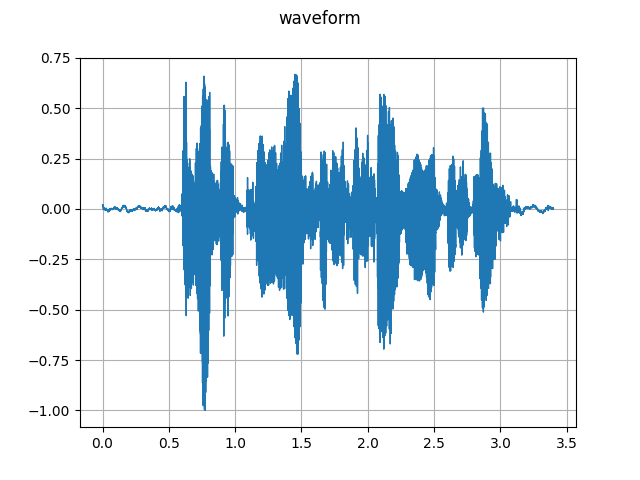
def plot_specgram(waveform, sample_rate, title="Spectrogram"):
waveform = waveform.numpy()
num_channels, num_frames = waveform.shape
figure, axes = plt.subplots(num_channels, 1)
if num_channels == 1:
axes = [axes]
for c in range(num_channels):
axes[c].specgram(waveform[c], Fs=sample_rate)
if num_channels > 1:
axes[c].set_ylabel(f"Channel {c+1}")
figure.suptitle(title)
plt.show(block=False)
plot_specgram(waveform, sample_rate)
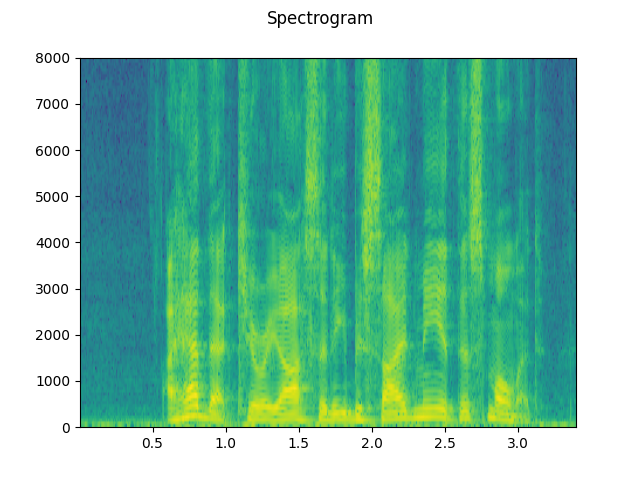
Audio(waveform.numpy()[0], rate=sample_rate)
Loading from file-like object
The I/O functions support file-like objects. This allows for fetching and decoding audio data from locations within and beyond the local file system. The following examples illustrate this.
# Load audio data as HTTP request
url = "https://download.pytorch.org/torchaudio/tutorial-assets/Lab41-SRI-VOiCES-src-sp0307-ch127535-sg0042.wav"
with requests.get(url, stream=True) as response:
waveform, sample_rate = torchaudio.load(response.raw)
plot_specgram(waveform, sample_rate, title="HTTP datasource")
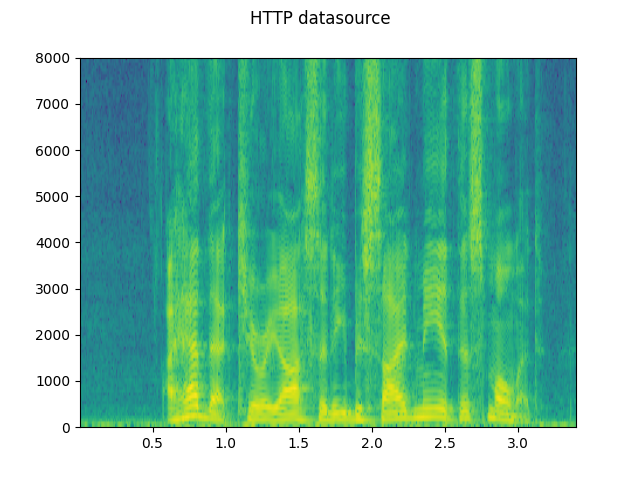
# Load audio from tar file
tar_path = download_asset("tutorial-assets/VOiCES_devkit.tar.gz")
tar_item = "VOiCES_devkit/source-16k/train/sp0307/Lab41-SRI-VOiCES-src-sp0307-ch127535-sg0042.wav"
with tarfile.open(tar_path, mode="r") as tarfile_:
fileobj = tarfile_.extractfile(tar_item)
waveform, sample_rate = torchaudio.load(fileobj)
plot_specgram(waveform, sample_rate, title="TAR file")
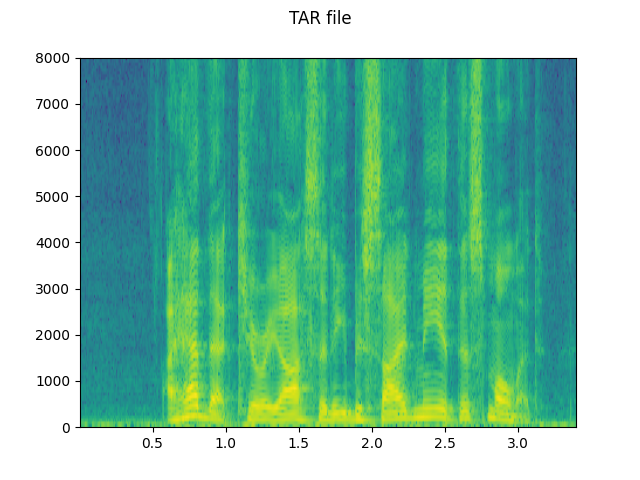
Out:
0%| | 0.00/110k [00:00<?, ?B/s]
100%|##########| 110k/110k [00:00<00:00, 35.9MB/s]
# Load audio from S3
bucket = "pytorch-tutorial-assets"
key = "VOiCES_devkit/source-16k/train/sp0307/Lab41-SRI-VOiCES-src-sp0307-ch127535-sg0042.wav"
client = boto3.client("s3", config=Config(signature_version=UNSIGNED))
response = client.get_object(Bucket=bucket, Key=key)
waveform, sample_rate = torchaudio.load(response["Body"])
plot_specgram(waveform, sample_rate, title="From S3")
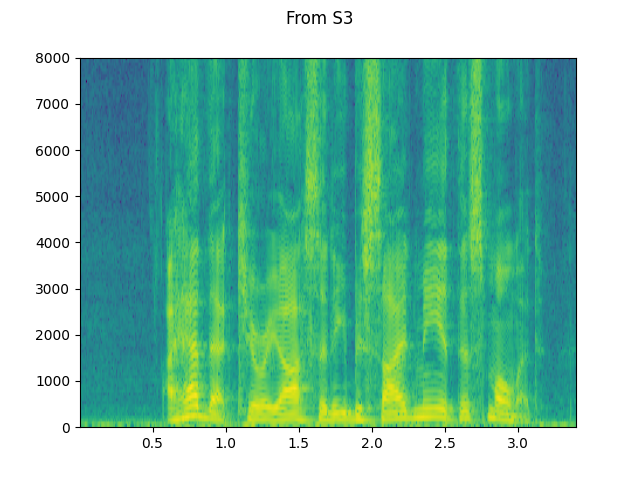
Tips on slicing
Providing num_frames and frame_offset arguments restricts
decoding to the corresponding segment of the input.
The same result can be achieved using vanilla Tensor slicing,
(i.e. waveform[:, frame_offset:frame_offset+num_frames]). However,
providing num_frames and frame_offset arguments is more
efficient.
This is because the function will end data acquisition and decoding once it finishes decoding the requested frames. This is advantageous when the audio data are transferred via network as the data transfer will stop as soon as the necessary amount of data is fetched.
The following example illustrates this.
# Illustration of two different decoding methods.
# The first one will fetch all the data and decode them, while
# the second one will stop fetching data once it completes decoding.
# The resulting waveforms are identical.
frame_offset, num_frames = 16000, 16000 # Fetch and decode the 1 - 2 seconds
url = "https://download.pytorch.org/torchaudio/tutorial-assets/Lab41-SRI-VOiCES-src-sp0307-ch127535-sg0042.wav"
print("Fetching all the data...")
with requests.get(url, stream=True) as response:
waveform1, sample_rate1 = torchaudio.load(response.raw)
waveform1 = waveform1[:, frame_offset : frame_offset + num_frames]
print(f" - Fetched {response.raw.tell()} bytes")
print("Fetching until the requested frames are available...")
with requests.get(url, stream=True) as response:
waveform2, sample_rate2 = torchaudio.load(response.raw, frame_offset=frame_offset, num_frames=num_frames)
print(f" - Fetched {response.raw.tell()} bytes")
print("Checking the resulting waveform ... ", end="")
assert (waveform1 == waveform2).all()
print("matched!")
Out:
Fetching all the data...
- Fetched 108844 bytes
Fetching until the requested frames are available...
- Fetched 65580 bytes
Checking the resulting waveform ... matched!
Saving audio to file
To save audio data in formats interpretable by common applications,
you can use torchaudio.save().
This function accepts a path-like object or file-like object.
When passing a file-like object, you also need to provide argument format
so that the function knows which format it should use. In the
case of a path-like object, the function will infer the format from
the extension. If you are saving to a file without an extension, you need
to provide argument format.
When saving WAV-formatted data, the default encoding for float32 Tensor
is 32-bit floating-point PCM. You can provide arguments encoding and
bits_per_sample to change this behavior. For example, to save data
in 16-bit signed integer PCM, you can do the following.
Saving data in encodings with a lower bit depth reduces the resulting file size but also precision.
waveform, sample_rate = torchaudio.load(SAMPLE_WAV)
def inspect_file(path):
print("-" * 10)
print("Source:", path)
print("-" * 10)
print(f" - File size: {os.path.getsize(path)} bytes")
print(f" - {torchaudio.info(path)}")
print()
Save without any encoding option. The function will pick up the encoding which the provided data fit
with tempfile.TemporaryDirectory() as tempdir:
path = f"{tempdir}/save_example_default.wav"
torchaudio.save(path, waveform, sample_rate)
inspect_file(path)
Out:
----------
Source: /tmp/tmpjcazc77u/save_example_default.wav
----------
- File size: 217658 bytes
- AudioMetaData(sample_rate=16000, num_frames=54400, num_channels=1, bits_per_sample=32, encoding=PCM_F)
Save as 16-bit signed integer Linear PCM The resulting file occupies half the storage but loses precision
with tempfile.TemporaryDirectory() as tempdir:
path = f"{tempdir}/save_example_PCM_S16.wav"
torchaudio.save(path, waveform, sample_rate, encoding="PCM_S", bits_per_sample=16)
inspect_file(path)
Out:
----------
Source: /tmp/tmp7o7n4jry/save_example_PCM_S16.wav
----------
- File size: 108844 bytes
- AudioMetaData(sample_rate=16000, num_frames=54400, num_channels=1, bits_per_sample=16, encoding=PCM_S)
torchaudio.save() can also handle other formats.
To name a few:
formats = [
"flac",
"vorbis",
"sph",
"amb",
"amr-nb",
"gsm",
]
waveform, sample_rate = torchaudio.load(SAMPLE_WAV_8000)
with tempfile.TemporaryDirectory() as tempdir:
for format in formats:
path = f"{tempdir}/save_example.{format}"
torchaudio.save(path, waveform, sample_rate, format=format)
inspect_file(path)
Out:
----------
Source: /tmp/tmpy0jw6hya/save_example.flac
----------
- File size: 37141 bytes
- AudioMetaData(sample_rate=8000, num_frames=27200, num_channels=1, bits_per_sample=24, encoding=FLAC)
----------
Source: /tmp/tmpy0jw6hya/save_example.vorbis
----------
- File size: 12588 bytes
- AudioMetaData(sample_rate=8000, num_frames=27200, num_channels=1, bits_per_sample=0, encoding=VORBIS)
----------
Source: /tmp/tmpy0jw6hya/save_example.sph
----------
- File size: 109824 bytes
- AudioMetaData(sample_rate=8000, num_frames=27200, num_channels=1, bits_per_sample=32, encoding=PCM_S)
----------
Source: /tmp/tmpy0jw6hya/save_example.amb
----------
- File size: 108858 bytes
- AudioMetaData(sample_rate=8000, num_frames=27200, num_channels=1, bits_per_sample=32, encoding=PCM_F)
----------
Source: /tmp/tmpy0jw6hya/save_example.amr-nb
----------
- File size: 2008 bytes
- AudioMetaData(sample_rate=8000, num_frames=27200, num_channels=1, bits_per_sample=0, encoding=AMR_NB)
----------
Source: /tmp/tmpy0jw6hya/save_example.gsm
----------
- File size: 5610 bytes
- AudioMetaData(sample_rate=8000, num_frames=0, num_channels=1, bits_per_sample=0, encoding=GSM)
Saving to file-like object
Similar to the other I/O functions, you can save audio to file-like
objects. When saving to a file-like object, argument format is
required.
waveform, sample_rate = torchaudio.load(SAMPLE_WAV)
# Saving to bytes buffer
buffer_ = io.BytesIO()
torchaudio.save(buffer_, waveform, sample_rate, format="wav")
buffer_.seek(0)
print(buffer_.read(16))
Out:
b'RIFF2R\x03\x00WAVEfmt '
Total running time of the script: ( 0 minutes 2.187 seconds)



